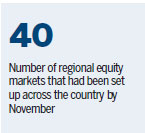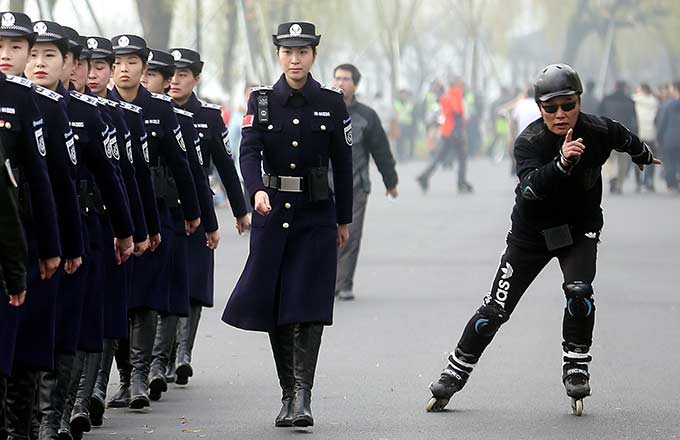Regional equity rules enhanced
Market's key role emphasized, investor requirements clarified
China is enhancing regulations for the regional equity market to boost its role in diversifying financing channels for the country's small, medium - and micro-sized businesses and to encourage private investment.
Updated regulations were approved on Wednesday by a State Council executive meeting presided over by Premier Li Keqiang.
The new regulations make clear the need for the regional equity market as a financing channel for local small businesses, and they provide more specific requirements for market operators and investors.
"A well-regulated regional equity market is fundamental to nurturing a multilayer capital market. It will also contribute significantly in supporting small, medium - and micro-sized businesses and deleveraging efforts," Li said.
The regional equity market offers financing flexibility for small businesses and technological innovation. While such enterprises tend to be financially vulnerable and carry greater risks, they are expected to play an important role in driving economic transition and boosting social investment by introducing new business models and industries.

By November, 40 regional equity markets had been set up across the country, with more than 15,900 companies.
The market also faces such challenges as a lack of well-defined legal status, undeveloped management and underdeveloped market functions. A better-regulated regional equity market is a pressing item on the reform agenda.
Under the new regulations, regional equity markets will mainly provide financing services for small, medium - and micro-sized businesses only within the provincial-level boundaries of a single administrative division. A deadline for doing so will be set for those currently operating in more than one such division. Local governments will be primarily responsible for managing and regulating local equity markets.
The regulations also stipulate that each regional market will be allowed to have only one operating agency, and those that now have multiple agencies will be required to consolidate them.
Requirements for investors will also be clarified. Only legal entities that meet the requirements, partnership businesses and individuals with sound financial backgrounds can join the market.
Additionally, stricter oversight is required. Local authorities and related central departments must work together in supervising the market.
Provincial-level governments will be responsible for market oversight and risk disposal, while the China Securities Regulatory Commission will be in charge of more specific regulations on issuing equities. Emphasis is placed on oversight, coordination and services to protect investors and maintain sound market order.
Meanwhile, central departments and local governments must continue to improve the measures to build a better environment and boost confidence, Li said.
Guo Tianyong, a finance researcher at Central University of Finance and Economics, said operational transparency should be improved for businesses in this market and a threshold set for institutional and individual investors. "Risks will be reduced when these are done."
Contact the writers at zhangyue@chinadaily.com.cn and huyongqi@chinadaily.com.cn


















